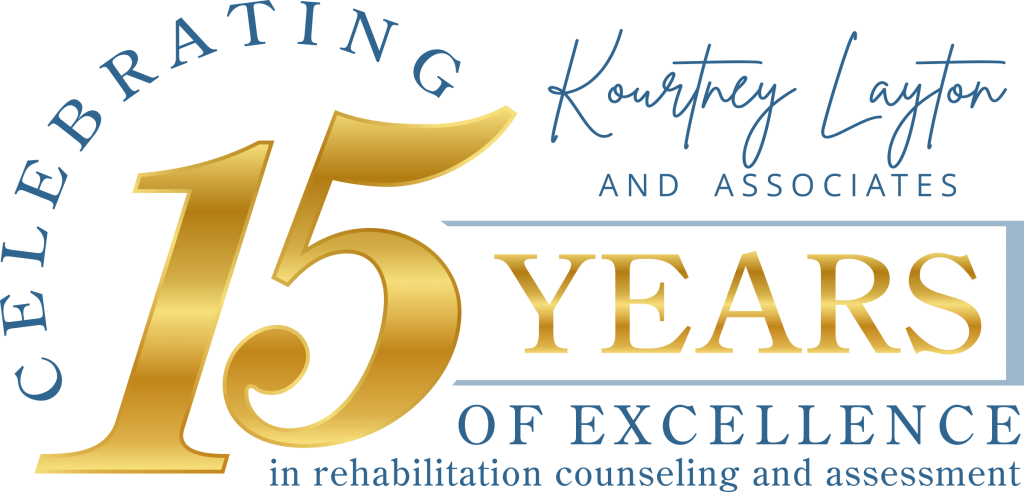Purpose and Nature/Type of Services
You have been referred for vocational rehabilitation evaluation services.
Services may include: vocational rehabilitation counseling, vocational evaluation and/or assessment, testing, rehabilitation plan development, job seeking skills development, job placement, independent living skill development and referrals for services. Generally, the goal of vocational rehabilitation services is to assist with employment and independent living. There may be other goals.
If services are provided beyond the initial meeting assessment, we will work jointly to develop a rehabilitation goal and plan. Authorization for further services may be required prior to initiation of those further services.
The rehabilitation plan may include a plan for: returning to work or to begin working, obtaining training/education, disability adjustment counseling, avocational activities, and increasing independent living skills. A rehabilitation plan may include: evaluations, rehabilitation counseling, case management, job readiness training, job seeking skills training, job development, assistance with returning to work, and assistance with independent living skills/services. The rehabilitation plan may also consist of other services. The plan will include services and actions needed to complete the rehabilitation plan.
Roles, Responsibilities, Rights, Limitations, and Risks
You are the client/evaluee, no matter who is funding the services. I will provide individualized services that respect your needs. You are encouraged to actively participate and ask questions or express concerns if you do not understand any part of the process. I am a Certified Rehabilitation Counselor (CRC). If you have concerns or complaints about your services, you should tell me. You could also inform the referral/funding source, and/or attorney (if you have an attorney), and the Commission on Rehabilitation Counselor Certification.
If a third party is paying for rehabilitation services, services may be limited. If the funding source does not pay for services, I may have to discontinue services for you. The funding source may have requirements for a continuation of services. In some cases, failure to participate could result in a change or reduction of your benefits. You have the right to discontinue services; however, this may have consequences, such as a reduction of benefits.
Duration and Frequency
The length of rehabilitation services and the number of visits or sessions vary on a case-by-case basis. The type and length of services depends on several factors. These factors may include: authorization for services, funding, your physical and mental abilities, and your progress. The frequency of meetings and services are based on your individual needs.
There will not be an ongoing counseling relationship for forensic evaluees.
Confidentiality and Privilege
Confidentiality is an important part of your rehabilitation services. Precautions are taken to protect personally identifiable information and/or protected health information to ensure confidentiality.
You will be asked to sign an authorization to release information to the third party paying for services. If you do not provide authorization to release information to the third party, I will not be able to communicate with the provider and I may not be able to provide rehabilitation services or obtain records needed for your case.
Confidentiality may be limited by the following conditions:
• If information is transmitted electronically.
• If any legal issues prevent your eligibility to work (i.e., lack of documentation, incarceration, conviction history).
• If I believe that you are going to harm or endanger yourself or others.
• If I believe you are going to harm or endanger or abuse children or elderly individuals.
• If I am required to comply with a subpoena or court order.
• If you are a minor or have a legal guardian.
• If consultation with colleagues, supervisors, or other professionals is required.
The usual expectation of confidentiality does not necessarily apply for forensic cases, as this is not a counseling relationship.
Qualifications and Credentials
All evaluations with Kourtney Layton & Associates are conducted by vocational experts who meet or exceed the standards for Vocational Expert testimony. The International Association of Rehabilitation Professionals (IARP) authored a White Paper in 2017[1] that reflects the necessary qualifications to testify as a Vocational Expert. These requirements were primarily adopted by the Social Security Administration, the largest disability court in the world, in 2019.
The following minimum standards are:
- A Master’s degree in Rehabilitation Counseling or other related Master’s degrees such as Counseling, Psychology, Education, Human Services or another behavioral science.
- At least five years of direct experience providing vocational rehabilitation services to individuals with disabilities. IARP recognizes that no one can be an expert without direct experience in the field.
- Employment as a principal, employee or private consultant in vocational counseling, vocational assessment or job placement of people with disabilities including labor market research and communicating with employers regarding the physical and mental demands of occupations.
- National certification including the Certified Rehabilitation Counselor (CRC), the American Board of Vocational Experts (ABVE) Fellow or Diplomate status, or the Certified Vocational Evaluator (CVE). National certification assures that one has met educational standards, passed an examination, and is bound to a scope of practice and ethical code.
- An SSVE who is teaching in the vocational rehabilitation field at the university or college level or administrators in the field of rehabilitation should also possess the required credentials or qualifications.
- IARP recommends ongoing membership in a professional organization that provides regular updates in the body of knowledge required of the Vocational Expert.
Kourtney Layton far exceeds these minimum standards. She has her Master’s in Vocational Rehabilitation Counseling from Utah State University. For over 18 years, Ms. Layton has provided direct vocational rehabilitation counseling and job placement services for persons with disabilities.
Additionally, Ms. Layton has been employed as a Vocational Expert since 2009 and has served on both plaintiff and defense cases. Her credentials include being a Diplomate (ABVE/D) and having the International Psychometric Evaluation Certification (IPEC) with the American Board of Vocational Experts, a Certified Rehabilitation Counselor (CRC) and Evaluator (CVE) with the Commission on Rehabilitation Counselor Certification, and a Certified Life Care Planner (CLCP) with the International Commission on Health Care Certification.
Possessing these numerous credentials involves meeting stringent eligibility requirements for the specific specialty, testing, and annual continuing education requirements. Credentials, in addition to professional associations, require the individual to uphold and be responsible to the Code of Ethics for each organization. Ms. Layton has been credentialed with all of these organizations for several years and remains in good standing.
[1] Aliff, M., & Jett, K. W. (2017). The White Paper: A Professional and Ethical Mandate for Professional Vocational Expert Services in SSA Determinations. Rehabilitation Professional, 25(3).

